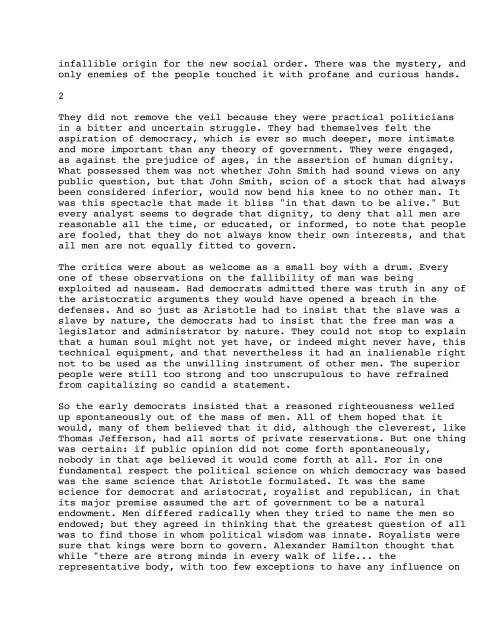PUBLIC OPINION by WALTER LIPPMANN TO FAYE LIPPMANN ...
PUBLIC OPINION by WALTER LIPPMANN TO FAYE LIPPMANN ...
PUBLIC OPINION by WALTER LIPPMANN TO FAYE LIPPMANN ...
You also want an ePaper? Increase the reach of your titles
YUMPU automatically turns print PDFs into web optimized ePapers that Google loves.
infallible origin for the new social order. There was the mystery, and<br />
only enemies of the people touched it with profane and curious hands.<br />
2<br />
They did not remove the veil because they were practical politicians<br />
in a bitter and uncertain struggle. They had themselves felt the<br />
aspiration of democracy, which is ever so much deeper, more intimate<br />
and more important than any theory of government. They were engaged,<br />
as against the prejudice of ages, in the assertion of human dignity.<br />
What possessed them was not whether John Smith had sound views on any<br />
public question, but that John Smith, scion of a stock that had always<br />
been considered inferior, would now bend his knee to no other man. It<br />
was this spectacle that made it bliss "in that dawn to be alive." But<br />
every analyst seems to degrade that dignity, to deny that all men are<br />
reasonable all the time, or educated, or informed, to note that people<br />
are fooled, that they do not always know their own interests, and that<br />
all men are not equally fitted to govern.<br />
The critics were about as welcome as a small boy with a drum. Every<br />
one of these observations on the fallibility of man was being<br />
exploited ad nauseam. Had democrats admitted there was truth in any of<br />
the aristocratic arguments they would have opened a breach in the<br />
defenses. And so just as Aristotle had to insist that the slave was a<br />
slave <strong>by</strong> nature, the democrats had to insist that the free man was a<br />
legislator and administrator <strong>by</strong> nature. They could not stop to explain<br />
that a human soul might not yet have, or indeed might never have, this<br />
technical equipment, and that nevertheless it had an inalienable right<br />
not to be used as the unwilling instrument of other men. The superior<br />
people were still too strong and too unscrupulous to have refrained<br />
from capitalizing so candid a statement.<br />
So the early democrats insisted that a reasoned righteousness welled<br />
up spontaneously out of the mass of men. All of them hoped that it<br />
would, many of them believed that it did, although the cleverest, like<br />
Thomas Jefferson, had all sorts of private reservations. But one thing<br />
was certain: if public opinion did not come forth spontaneously,<br />
nobody in that age believed it would come forth at all. For in one<br />
fundamental respect the political science on which democracy was based<br />
was the same science that Aristotle formulated. It was the same<br />
science for democrat and aristocrat, royalist and republican, in that<br />
its major premise assumed the art of government to be a natural<br />
endowment. Men differed radically when they tried to name the men so<br />
endowed; but they agreed in thinking that the greatest question of all<br />
was to find those in whom political wisdom was innate. Royalists were<br />
sure that kings were born to govern. Alexander Hamilton thought that<br />
while "there are strong minds in every walk of life... the<br />
representative body, with too few exceptions to have any influence on





